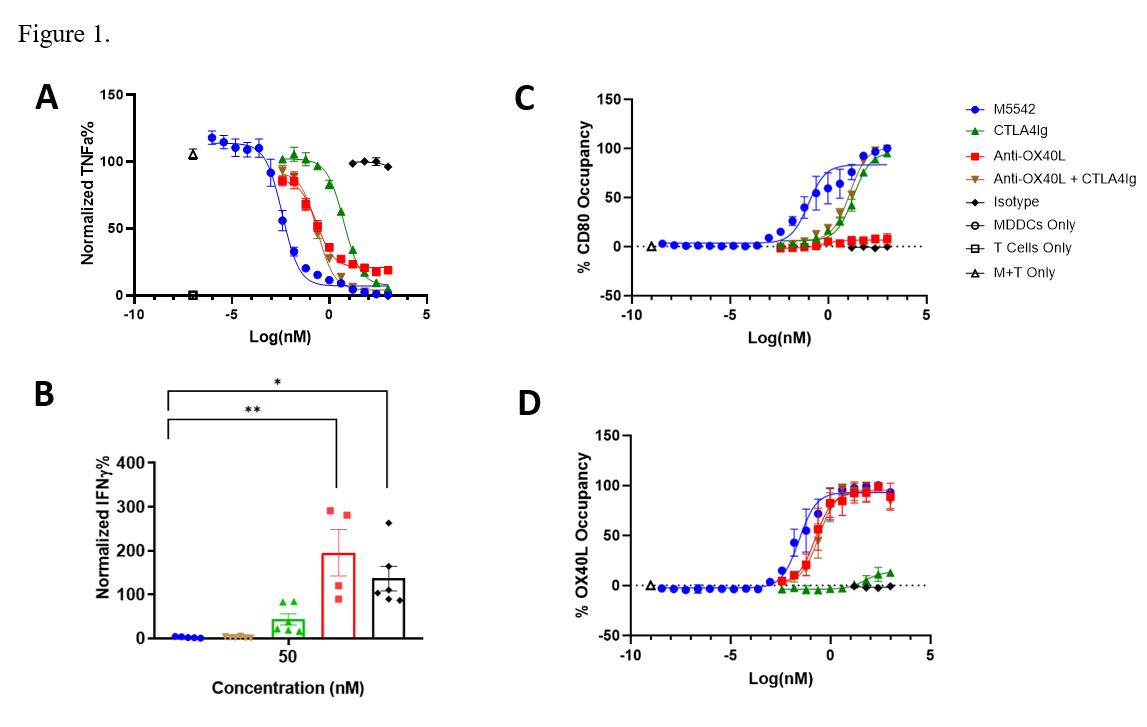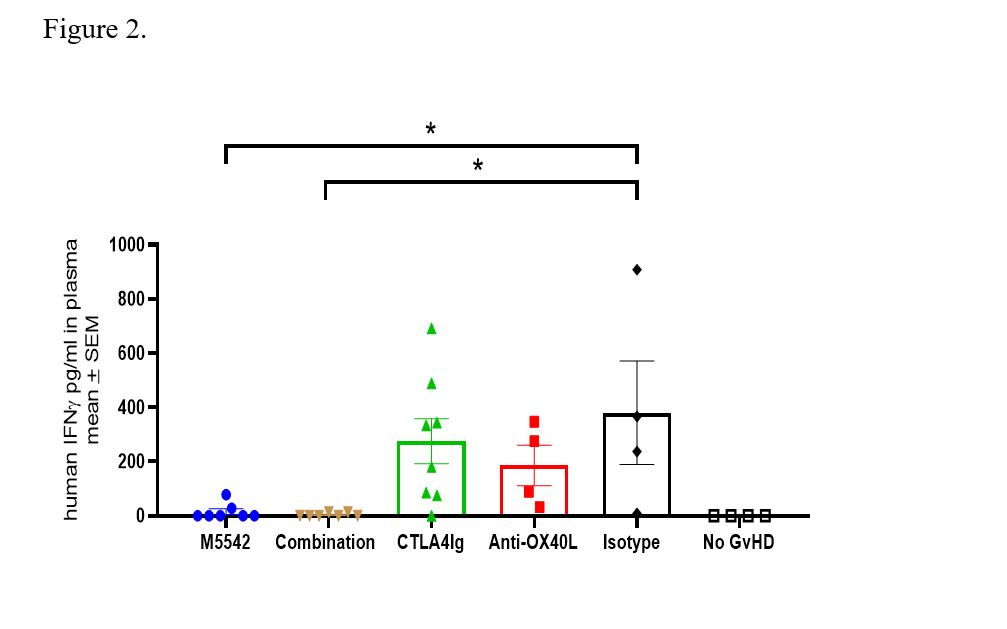Session Information
Date: Monday, November 18, 2024
Title: T Cell Biology & Targets in Autoimmune & Inflammatory Disease Poster
Session Type: Poster Session C
Session Time: 10:30AM-12:30PM
Background/Purpose: Overactive adaptive immune responses contribute to many autoimmune diseases such as systemic lupus erythematosus (SLE). Chronically activated autoreactive T-effector cells play a pivotal role in subgroups of SLE and other autoimmune diseases. Since T-cells require co-stimulation signals to be fully activated and differentiate into T-effectors, we hypothesized that modulating two main costimulatory pathways mediated by CD28 and OX40 signaling, would produce efficient control of excessive T-cell activation and effector function. To explore whether dual pathway blockade is superior to single pathway blockade, we investigated the in vitro potency and in vivo efficacy of M5542, a novel CD80, CD86, and OX40L antagonist, and a bi-functional fusion molecule that blocks the CD28 and OX40 pathways to inhibit T-cell activation and function, thereby curbing inflammation in autoimmune diseases.
Methods: M5542, single agent comparators abatacept (CTLA4Ig) and anti-OX40L, or the combination thereof were tested for their ability to inhibit proinflammatory cytokine production in a mixed lymphocyte reaction (MLR) of activated monocyte-derived dendritic cells (MDDCs) and T-cells from healthy donors or SLE peripheral blood mononuclear cells (PBMCs). Binding affinities of all molecules to their targets CD80, CD86 or OX40L were assessed by surface plasmon resonance. Target occupancy of CD80, CD86 and OX40L on the dendritic cells was assessed by flow cytometry. All molecules were tested for their efficacy to reduce disease in a humanized xenogenic graft-vs-host disease (xeno-GvHD) mouse model.
Results: M5542 demonstrated superior inhibition of TNFa production compared to CTLA4Ig, anti-OX40L or the combination of both single agents in an allogenic MLR assay in vitro (Figure1A, similar observation with IL-6 and IFNg, data not shown). M5542 bound targets CD80 (KD = 522 nM), CD86 (KD = 434 nM), and OX40L (KD = 41 nM), with similar affinities as the single agents CTLA4Ig (CD80 KD = 552 nM), (CD86 KD = 548 nM) and anti-OX40L (KD = 50 nM). M5542 significantly reduced IFN-g in a SLE PBMC activation assay in vitro (Figure 1B). Interestingly, M5542 showed increased % target occupancy of CD80 and OX40L, compared to equimolar concentrations of CTLA4Ig or anti-OX40L alone, leading to the enhanced potency of M5542 in the MLR assay (Figure1C-D). M5542 demonstrated superior efficacy compared to single agents CTLA4Ig or anti-OX40L alone in suppressing human IFN-g levels and disease development in a humanized xeno-GvHD mouse model (Figure 2).
Conclusion: M5542 effectively blocked CD28 and OX40 mediated T-cell activation and reduced T-cell driven inflammation, demonstrating promise in treating autoimmune diseases.
To cite this abstract in AMA style:
Downing M, Zhang L, Desphpande A, Zhang H, Tarcic O, toister-achituv M, Gross A, Chen G, Sun C. M5542: A Potent CD80, CD86, and OX40L Antagonist Fusion Molecule for the Treatment of Autoimmune Diseases [abstract]. Arthritis Rheumatol. 2024; 76 (suppl 9). https://acrabstracts.org/abstract/m5542-a-potent-cd80-cd86-and-ox40l-antagonist-fusion-molecule-for-the-treatment-of-autoimmune-diseases/. Accessed .« Back to ACR Convergence 2024
ACR Meeting Abstracts - https://acrabstracts.org/abstract/m5542-a-potent-cd80-cd86-and-ox40l-antagonist-fusion-molecule-for-the-treatment-of-autoimmune-diseases/


